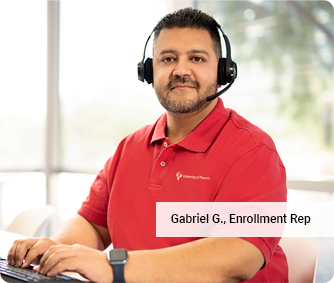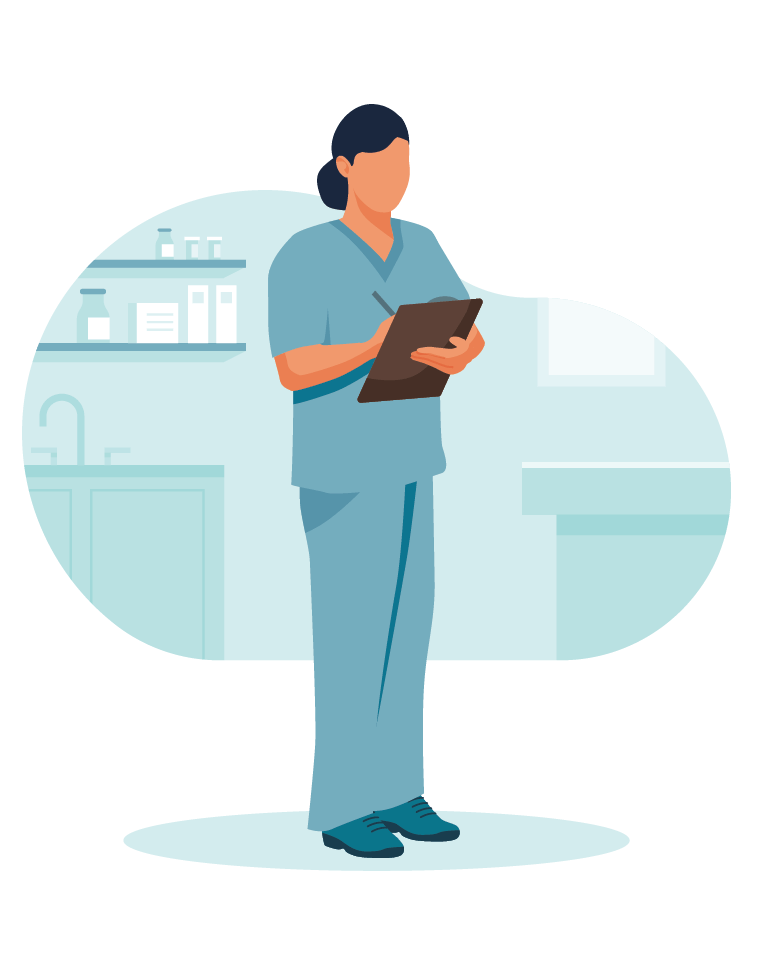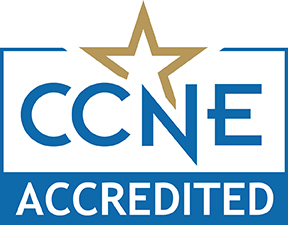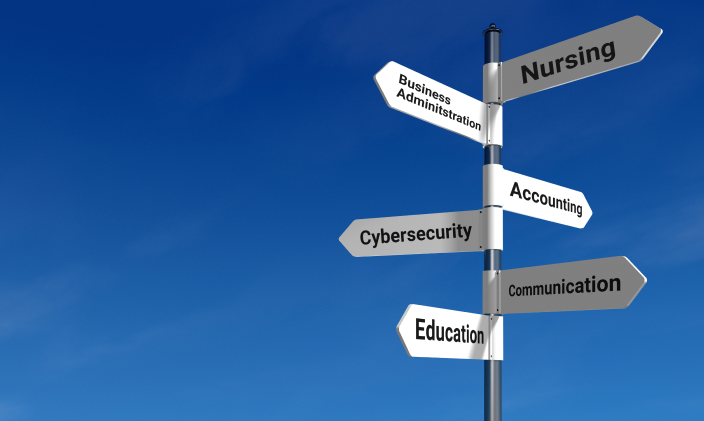
Online RN to BSN Degree
Registered Nurse to Bachelor of Science in Nursing
Passionate about delivering positive patient outcomes and supporting healthcare systems? If so, our programmatically accredited Registered Nurse (RN) to Bachelor of Science in Nursing (BSN) degree online can equip you with professional, post-licensure skills to enhance your nursing practice – faster. Develop competencies as a researcher, practitioner and leader to help you make informed clinical decisions in your role as a professional nurse.
Did you know? You may be able to complete your RN to BSN degree online in 14 months by transferring an associate degree in nursing (ADN) or eligible associate degree from a school with approved accreditation. If eligible, you’ll receive 87 credits for an ADN. If you don’t have an ADN transfer, RNs receive 40 total credits and may complete their degree in 2.5 years.
RN to BSN highlights
- A post-licensure education program for registered nurses (RNs)
- Accredited by the Commission of Collegiate Nursing Education (CCNE)[1]
- You must have an active and unencumbered RN license prior to enrolling
- Coursework emphasizes health promotion and disease prevention strategies
[1] The baccalaureate degree program in nursing, master's degree program in nursing, and Doctor of Nursing Practice program at the University of Phoenix are accredited by the Commission on Collegiate Nursing Education, 655 K Street, NW, Suite 750, Washington, DC 20001, 202-887-6791.
Ignite Your Passion
Start when you're ready
Courses
Browse courses for your RN to BSN degree online
The bachelor’s in nursing program helps you develop the professional knowledge and skills of RNs. Our curriculum builds on a foundation of biological, physical and social sciences paired with the intellectual, social, and cultural aspects of the professional nurse. Our coursework focuses on skills, such as critical thinking in holistic nursing, compassion in population health and case management.
Program Handbook: Nursing Student Program Handbook
Look for this icon to see which skills you’ll learn in a course.
BSN degree requirements
You’ll need 120 credits[2] to complete the RN to BSN degree online. Your course schedule may vary based on transferable credits or credits earned through the University’s Prior Learning Assessment.
Our required core courses in topics like professional nursing leadership and integrity in practice are designed to prepare you as a generalist. You’ll learn how to apply critical thinking, professional skills, leadership and knowledge to make clinical decisions that will result in positive patient outcomes and support healthcare systems.
This program curriculum is aligned with recommendations by leading industry organizations, such as:
- American Association of Colleges of Nursing (AACN®)
- Quality & Safety Education for Nurses (QSEN)
Earn badges from your nursing courses
As a student in the RN to BSN degree online program, you can earn digital badges (also known as micro-credentials) from your coursework and upon completion of your degree. These badges help bridge the gap between academic and industry and can help prove you have specific, measurable knowledge.
When you earn the Emergency Preparedness Badge, you’re prepared to maximize patient safety and decrease exposure to prevent the spread of infections during an outbreak, natural disaster, or public health emergency. You’re also prepared to use community health strategies for disaster management.
When you earn the Communication Badge, you’re prepared to integrate patient care communication and information technology systems in health care delivery to improve patient outcomes.
When you earn the Organizational Collaboration Badge, you’re prepared to utilize interprofessional care coordination strategies to promote quality patient care.
When you earn the Problem-Solving Badge, you’re prepared to implement appropriate health promotion and disease prevention strategies for diverse individuals, families and populations across the life span.
Prepare for a Public Health Nurse (PHN) Certification
If you reside in California, our BSN degree provides you with coursework that’ll allow you to apply for a Public Health Nurse (PHN) certification in California.
Plan your schedule
Your academic counselor will help you schedule your courses for the bachelor’s in nursing degree. By taking just one 5-week course at a time, you can plan around personal commitments while still achieving your educational goals. If you qualify and want to take more courses at a time to finish your RN to BSN degree online faster in a minimum of 48 weeks, check out our competency-based RN to BSN program.
Interested in pursuing a master’s degree after your bachelor’s degree? If so, you might consider our master’s pathway for nursing. You can save time by completing two required courses for one of our master’s degree programs while finishing your bachelor’s degree requirements as part of your elective credits. The master’s nursing pathway is available for a Master of Science in Nursing with a concentration in Nurse Administration, a Master of Science in Nursing with a concentration in Nurse Education or a Master of Science in Nursing with a concentration in Informatics. Speak with an enrollment advisor or your academic counselor for more information.
Program Purpose Statement
The RN to BSN program is a post-licensure education program designed for nurses with active, unencumbered RN licensure who wish to obtain a bachelor’s degree in the professional field of nursing. The program is designed to develop the professional knowledge and skills of registered nurses and prepare them as generalists who are able to apply critical thinking, professional skills and knowledge to patient outcomes and healthcare systems.
Earn career-relevant skills in weeks – not years.
Learning shouldn’t take years to put into practice. That’s why we’re empowering you to build career-relevant skills with every five- to six-week course.
We’ve worked with the labor market researcher Lightcast to identify in-demand skills for occupations and mapped those to our related associate, bachelor’s and master’s degree programs.
Tuition
Paying for school
Tuition is based on number of credit hours per course. Courses are typically 3 credits, but can range from 1-6 credits. Costs do not include savings opportunities like transfer credits and scholarships.
What affects the overall cost of my program?
Your full program cost can vary by:
- Savings opportunities. Your cost could be reduced with eligible transfer credits, scholarships, employer discounts and more. Students with eligible credits and relevant experience on average saved $11K and 1 year off their undergraduate degree at University of Phoenix.
With our Tuition Guarantee, you pay one flat, affordable rate from the moment you enroll to the day you graduate from your program.
Discover ways to save time and money on your degree with our Savings Explorer® tool:
Save time and money with our 3+1 transfer pathway
Through our 3+1 transfer pathway, associate degree in nursing students can take 3 years of general course requirements at a participating community college and complete a bachelor’s degree in a little over one year at University of Phoenix. Transfer up to 87 credits and save $144 on every 3-credit course.
Get a jumpstart on your RN to BSN degree online
Through our Community College Concurrent Enrollment Program (CEP), you can start upper-division nursing courses for our bachelor’s in nursing program at University of Phoenix while finishing your ADN degree with one of our alliance community colleges.
Other ways to save on time and tuition
Because we believe everyone deserves an affordable education, we work hard to help our students achieve one. Here’s a few ways you can save time, save money and avoid starting from scratch.
Transfer credits
Your prior eligible college credits can lower your cost and help you graduate sooner. As a transfer-friendly university, we accept eligible credits from 5,000+ accredited institutions.
Employer tuition benefits
Are you employed? Check to see if your employer has an alliance agreement with us for education benefits. This can help you save money while gaining skills that could apply to your job.
Credit for life experience
We look at all your relevant experience, from parenting to past jobs, to help you get the college credits you deserve. For every 3 credits earned, shave 5 weeks off your degree.
Alumni savings
Are you a Phoenix alum? If so, you’re eligible for special tuition rates and can save up to $2,880 on a bachelor’s degree. You can also save with an alumni scholarship.
Military savings
If you’re an active-duty service member in the U.S. Armed Forces or an eligible spouse or dependent, you may be eligible for a lower, military tuition rate and can save on tuition.
National testing providers
Do you have expertise in a specific subject? Earn college credit based on your performance on national, standardized tests to save time and money on tuition.
We can help you get started
Chat with an experienced advisor who can guide you through tuition, financial aid, scholarships, transfer credits and more.
- View 1
- View 2
- View 3

Budget & borrow
How to pay for college
Paying for school can be intimidating, but we’re here to help you make sense of it. Our finance advisors can walk you through your options like federal financial aid and savings opportunities to minimize your debt. Plus, we can help you figure out your financial plan.
Careers & Outcomes
What can you do with an online BSN degree?
As the health care needs of our nation grow increasingly complex, employers are expressing a strong preference for professional nurses with a bachelor’s in nursing degree. Plus, BSN-prepared nurses are developing notable skills in critical thinking, leadership, case management and health promotion that increase their ability to practice across a variety of inpatient and outpatient settings.

When you earn your BSN degree, you’ll be equipped with a concrete set of skills you can apply on the job. You’ll learn how to:
- Demonstrate evidence-based, holistic, patient centered care that reflects knowledge of the health-illness continuum.
- Implement appropriate health promotion and disease prevention strategies for diverse individuals, families, and populations across the life span.
- Demonstrate professional standards of moral, ethical, and legal conduct in health care industry.
- Apply leadership and organizational principles that promote safe health care delivery and nursing practice.
- Incorporate strategies that influence health policy at state, national, and international levels for the provision of safe, quality patient care.
- Integrate patient care communication and information technology systems in health care delivery to improve patient outcomes.
- Utilize interprofessional care coordination strategies to promote quality patient care.

Top skills learned in this program:
Business Management for Nursing Professionals
Communications
Compassion in Population Health
Coordinating Safe Care
Critical Thinking and Holistic Nursing
Health Administration
Information Management and Communication
Leadership
Professionalism in the Nursing Field
Quality Improvement and Case Management
Strategic Planning

An RN to BSN degree online can prepare you to be a:
- Charge Nurse
- Public Health Nurse (PHN)
- Director of Nursing (DON)
6% growth
According to the Bureau of Labor Statistics, job growth for registered nurses occupations is projected to be faster than average between 2023 and 2033.
The BLS Projected Growth for 2023-2033 is published by the US Bureau of Labor Statistics. This data reflects the BLS’ projections of national (not local) conditions. These data points are not specific to University of Phoenix students or graduates.
Industry Spotlight
The state of nursing
According to the American Association of Colleges of Nursing (AACN), nursing is the nation’s largest healthcare profession, and most healthcare services involve some form of care by nurses. Many employers are strongly preferring candidates who are baccalaureate prepared.
Diverse work environments
Nurses are needed in both acute care and community settings, which creates more opportunity for those pursuing a career in nursing. You can work in private practice, public health agencies, primary care clinics, home health care, nursing homes, schools, mental health agencies, military and more.
On-the-job responsibilities
BSN-prepared professional nurses might partake in job duties like assessing patients’ conditions, observing patients and recording observations, administering medications, performing diagnostic tests and analyzing the results, operating medical equipment, setting up plans for patient’s care, explaining what to do at home after treatment and more.
Admissions
Apply for free – no application fee, no obligation.
Starting your degree is a big decision — and we want you to feel great about it. That’s why we remove obstacles from your application.
- No SAT/ACT required
- No essay required
- No cost, risk-free trial for eligible students
- We’ll request transcripts at no cost to you, when possible, and we accept eligible credits from over 5,000 accredited institutions.
How to enroll at University of Phoenix

Gabriel G., Enrollment Rep
Receive 1-on-1 support
You have a support team of real people you can lean on. And our academic counselors, who are with you every step of the way, have earned a 5-star rating from 85% of our surveyed students.[1]
[1] Transactional Survey, September 2022-August 2023 (23,739 respondents)
Start a conversation with an enrollment representative today.
Call us at 844-937-8679 or chat with us 7 days a week.
Receive 1-on-1 support
You have a support team of real people you can lean on. And our academic counselors, who are with you every step of the way, have earned a 5-star rating from 90% of our surveyed students.[1] Start a conversation with an enrollment representative today.
[1] Transactional Survey, August 2021-22 (18,645 respondents)

Call or chat with us 7 days a week.
BSN Student Experience
Balance family, work and school
Our RN to BSN degree online is designed with busy nurses in mind. Our instructional courses are delivered asynchronously so you can complete courses when it’s convenient for you.
Learn AACN Essentials
Our bachelor’s in nursing courses align with the American Association of Colleges of Nursing Essentials, which outline the necessary curriculum content and expected competencies of RN to BSN graduates.
Demonstrate new skills
You’ll complete assignments that mimic activities you’ll be performing as a professional nurse. You’ll practice, apply and demonstrate skills such as infection control and treatment planning in authentic assignments.

Faculty Spotlight
Nursing professionals dedicated to you
Your success is a top priority for our faculty members. They bring an average of 28+ years of experience and hands-on perspective to the classroom. Our nursing faculty leverage their practical experience as chief nursing officers, directors of services, vice president of operations and more to help bridge the gap between academics and industry knowledge. Our faculty also model compassion and empathy for their students.
Accreditation
Count on the quality of your education
programmatic accreditation
The baccalaureate degree program in nursing, master's degree program in nursing, and Doctor of Nursing Practice program at the University of Phoenix are accredited by the Commission on Collegiate Nursing Education, 655 K Street, NW, Suite 750, Washington, DC 20001, 202-887-6791.


Frequently asked questions about the Bachelor of Science in Nursing degree
The RN to BSN degree online at University of Phoenix is a post-licensure education program. The BSN degree enables you to leverage your existing knowledge and experience from being a licensed RN. You can also transfer an associate degree in nursing (ADN), if applicable, to complete the program faster.
Our bachelor’s in nursing program includes 11 core courses in topics such as health information technology for nursing, research outcomes management for the practicing nurse, healthcare policy and public health.
In our RN to BSN degree online, you’ll learn skills, such as:
- Business Management
- Communications
- Compassion in Population Health
- Coordinating Safe Care
- Critical Thinking and Holistic Nursing
- Health Administration
- Information Management and Communication
- Leadership
- Professionalism
- Quality Improvement and Case Management
- Strategic Planning
Learn more about online nursing degrees.
No, a bachelor’s in nursing is not the same as a registered nurse (RN). A BSN is an educational degree in nursing. An RN designation may only be used after completing all requirements and obtaining licensure by a state board of nursing as a registered nurse. If you’re an RN, you can pursue a BSN degree for expanded skills and greater career opportunities in your field.
A BSN stands for a Bachelor of Science in Nursing. It’s typically a four-year program for students who seek to become a registered nurse, or those who already are a registered nurse and wish to pursue additional education to enhance their nursing career. Many RNs will enroll in RN to BSN programs to further their education in the nursing field from a nursing diploma or an associate degree to a bachelor’s degree.
A registered nurse (RN) is a licensed medical professional who provides patient care and provides educational and emotional support for those individuals and their families. Depending on the specialty of the registered nurse, their specific duties will vary.
Learn more about RN to BSN degrees.
The length of time to complete your bachelor’s in nursing program varies depending on the program you choose and your educational history.
- Our traditional RN to BSN degree online can be completed in as little as 14 months for students who transfer in an associate degree in nursing (ADN). RNs without an ADN transfer will be awarded 40 total credits and may complete their degree in 2.5 years.
- Our competency-based RN to BSN program is 12 months long but has more requirements to enter.
Yes, our RN to BSN degree online is designed with the working registered nurse (RN) in mind. You’ll take one course at a time, every five weeks, and all the instructional information is delivered asynchronously. This is important because we understand nurses like you are likely working around the clock and need to be able to complete assignments at a time that’s convenient for you and your schedule.
In our bachelor’s in nursing program, you’ll take most of the courses online. However, two courses require direct care clinical hours. The direct care clinical hours must be completed face-to-face in community settings. You’re required to complete 45 direct care clinical hours in each of the two courses for a total of 90 hours.
Our RN to BSN degree online helps registered nurses (RNs) enhance their knowledge and prepare for new career opportunities. Career opportunities could include roles as a public health nurse, director of nursing, nursing instructor and staff nurse. Additionally, you'll have the education to work in a range of settings such as hospitals, physician's offices, outpatient care centers, home healthcare, nursing and residential care facilities, and more. Some nurses travel frequently in the United States and throughout the world to help care for patients in places where there are not enough healthcare workers.
If you’re currently working as an RN, the RN to BSN degree online at University of Phoenix allows you to take courses when it fits your busy schedule as a working nurse. You also have access to highly rated 1-on-1 support, available 20 hours a day, 5 days a week to help you while earning your BSN.
You may be eligible to enroll in a competency-based RN to BSN degree program which can reduce the time it takes to complete your BSN degree. There are specific admission requirements including qualifying prior work experience.
[2] Current, unencumbered, RN license required.
While widely available, not all programs are available to residents of all states. Please check with a University Enrollment Representative.





